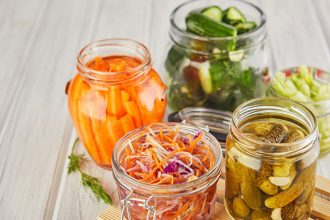Vitamin K. It’s very much the undiscussed vitamin! Nutritionist and Thrive Expert Anne Lecomber looks at the important role that vitamin K plays in our diet.
Vitamin K plays a vital role in blood clotting, and there is some evidence it is beneficial for bone health through the regulation of calcium. But, unless you are expecting a baby or are already a mother, you may not have given much thought to vitamin K.
This is because deficiency in adults is rare. We only require 1 microgram per day per kilogram of our bodyweight, and if we consume it in excess, it is stored in the liver, which means we don’t even need to consume it every day. It is hard not to though!
Sources of Vitamin K
There are two type of Vitamin K – Vitamin K1 and Vitamin K2. The good bacteria in our large intestine synthesise K2 but not K1. Leafy green vegetables are by far the best dietary source for K1. In fact, the prefix phyllo- from the scientific name phylloquinone, comes from the Greek word phýllon, which literally means ‘leaf’. You can find smaller amounts of K1 in several other foods too including cereals, meat, fish, liver and some fruits. K2 is found in dairy and fermented foods. Therefore, if you eat a varied balanced diet, you should be able to meet your VK requirements. The ever lucrative supplement market has seen a surge in demand for Vitamin K supplements in recent years, and this is predicted to continue, but the truth is, unless you have absorption issues, you don’t need them! Ditch those overpriced supplements and reach for the veg!
If you eat a varied balanced diet, you should be able to meet your VK requirements. Ditch those overpriced supplements and reach for the veg!
Mothers and their babies
Vitamin K deficiency in new-born babies is unfortunately more common than in adults. This is mainly due to new-borns having reduced stores of Vitamin K from insufficient placental transfer during pregnancy. As their bodies have been protected from the outside world, they don’t yet have the bacteria needed to produce Vitamin K. This can be exacerbated if babies are solely breastfed and the breast milk contains insufficient Vitamin K, and maternal supplementation during pregnancy has been shown to have no effect on Vitamin K stores in the new-born baby. As Vitamin K is needed to produce four of the clotting proteins, if there is a deficiency at birth, this can lead to a condition referred to as Vitamin K Deficiency Bleeding (VKDB).
Uncontrolled bleeding can happen anywhere in the body, but bleeding on the brain and in the intestines is common and can be fatal. Depending on whether this is early onset (first 24 hours following birth) or the classic form (2 – 12 weeks) the prevalence can range from between 6-12% and 0.01-0.44% respectively. A large study published in The Lancet in the 1940s showed a fivefold reduction in death from internal bleeding in babies who were given 1 mg of Vitamin K, and it is recommended widely that new-borns be given a Vitamin K prophylaxis to prevent this. In the UK, VKBD is most common where parents breastfeed and refuse a prophylaxis. A Vitamin K prophylaxis can be in the form of an injection or repeated oral doses, but the latter is less effective and convenient.
Vitamin K and heart health
It is believed that foods high in Vitamin K prevent calcium deposits in the heart, and therefore help to prevent heart disease. However, this is based on observations rather that clinical trials, and this benefit has not been seen in trials using Vitamin K supplements. This could mean that the foods that contain Vitamin K could contain other nutritional factors that are beneficial for your heart, like fibre, phytonutrients, B vitamins and omega-3 and minerals. You would be better off focussing on getting those leafy green vegetables and grains into your diet if you are concerned about your heart health.
I feel like a broken record ,but eat your veggies! Not just for Vitamin K but for all the other nutrients and related benefits. During this strange time where health is more important than ever, a balanced diet is more effective at giving your immune system the best chance rather than focussing on single nutrients.
References
Sankar, M. J., Chandrasekaran, A., Kumar, P., Thukral, A., Agarwal, R., & Paul, V. K. (2016). Vitamin K prophylaxis for prevention of vitamin K deficiency bleeding: a systematic review. Journal of perinatology : official journal of the California Perinatal Association, 36 Suppl 1(Suppl 1), S29–S35. https://doi.org/10.1038/jp.2016.30
Shahrook, S., Ota, E., Hanada, N., Sawada, K., & Mori, R. (2018). Vitamin K supplementation during pregnancy for improving outcomes: a systematic review and meta-analysis. Scientific reports, 8(1), 11459. https://doi.org/10.1038/s41598-018-29616-y
https://patient.info/doctor/vitamin-k-deficiency-bleeding
https://www.nhs.uk/conditions/vitamins-and-minerals/vitamin-k/
Article written by Thrive Expert – Anne Lecomber. Anne holds a First class honours (BSc) degree in Human Nutrition at the University of Greenwich. Anne has a keen interest in nutrition’s involvement in mood disorders, as well as nutrigenetics and nutrigenomics. Find out mroe at: www.sugarfreescience.co.uk










